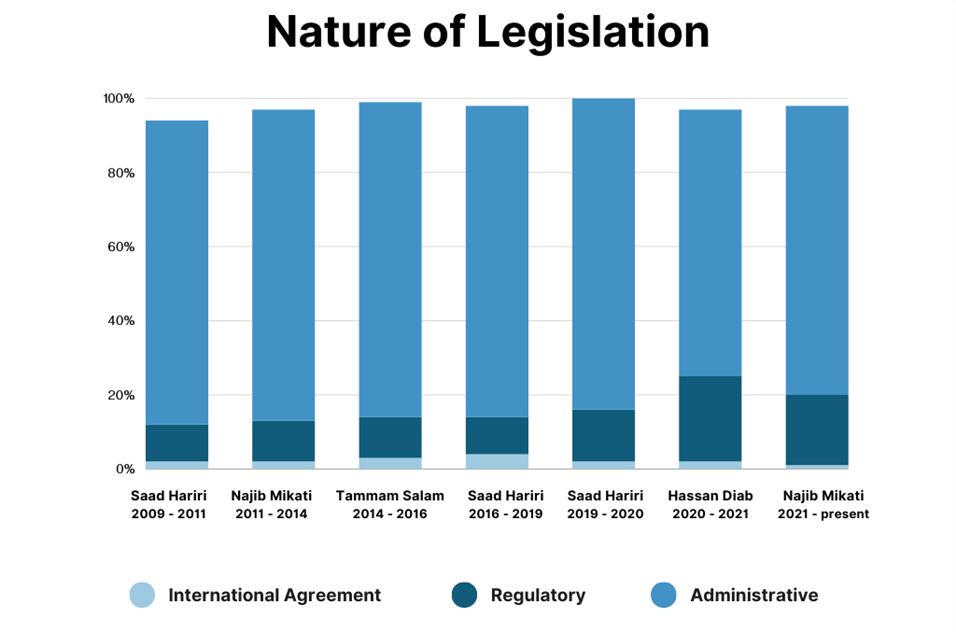-
GovernanceSep 04, 2024
Legislative Priorities in Lebanon: Insights from the Legislation Tracker
- Pierre Boutros

This article was produced with support from the National Democratic Institute (NDI). The opinions expressed here do not reflect those of the donor.
As more people are becoming engaged in the public sphere, they seek out ways to understand the factors that shape their political environment. However, this may be hard without access to the right data. Despite greater access to information provided by the Access to Information Law passed in 2017, it is still difficult to have a broad understanding of what policymakers in Lebanon are focusing on.
This is crucial in a democratic country like Lebanon, where transparent access to legislative data is needed to enhance accountability and trust in government. Recognizing this need, the Lebanese Center for Policy Studies (LCPS) launched the Legislation Tracker, an online tool that gathers and presents legislative data and key government decisions in one place. This article introduces the Legislation Tracker, details its functionalities, and explains its importance by illustrating key figures and findings across several governments.
Tracker benefits
The Legislation Tracker is designed to equip decision makers, researchers, journalists, university students, and the general public with the necessary data to scrutinize and analyze the policymaking processes. It offers a systematic and interactive means to access and interpret government decisions. By identifying certain patterns in policymaking, such as the frequency and type of decisions, it provides insights into government priorities.
The Legislation Tracker also enables users to pose and explore critical research questions. For instance, why are certain policy issues prioritized over others within government agendas? Additionally, it allows for the analysis of governmental behavior, such as the tendency to frequently address less severe problems, while more critical issues remain unaddressed.
The benefits of the Legislation Tracker are manifold. First, it organizes government decisions under specific categories, simplifying the process of identifying relevant documents. Second, users can leverage the Tracker to create easy-to-read representations, such as graphs and charts that capture trends across different governmental administrations. Additionally, the Tracker increases transparency, allowing users to hold officials accountable.
Data source
The Legislation Tracker uses data from the Lebanese Official Gazette, the official government journal that publishes decisions and legislative texts. Since the data must be published to take effect and become legally binding, it ensures that the data used by the Tracker is both official and up-to-date.
Tracker categorization
After downloading the data, LCPS analyzes and then categorizes the legislative texts, [1] according to three dimensions of policymaking: policy area, nature, and administrative function.
Policy area
A policy area refers to a specific field or category that a piece of legislation or government decision addresses, such as labor, health, or education. LCPS categorizes policy areas using the Comparative Agendas Project (CAP)[2] methodology, an established coding system that provides a comprehensive and publicly accessible code book. CAP organizes policy topics into 21 major categories[3] and 220 subtopics, ensuring that each legislative text is systematically attributed to one major topic and one subtopic.
Nature
The nature of a legislative text identifies its primary purpose, a classification methodology developed by LCPS. Texts are categorized based on whether they regulate or administer governmental operations, or formalize agreements with external parties. Specifically:
- Regulatory legislation introduces or modifies rules that apply to specific groups or organizations, such as regulating imports, passing national budgets, or changing educational curricula.
- Administrative legislation applies existing rules to specific groups or organizations, such as granting citizenship, appointing personnel, or approving public works.
- International agreements are legislative texts that formalize arrangements with entities from other countries, such as trade agreements.
Administrative function
For each legislation classified as administrative, LCPS assigns a specific function, an approach also developed by LCPS. These functions include tasks such as issuing licenses and stamps or appointing government employees. LCPS has identified 38 unique functions that these legislative texts perform. On the other hand, legislation classified as regulatory is not restricted to any one function.
Presenting findings
In the Legislation Tracker, each entry—legislation, a decree, or a decision—is defined by 17 distinct variables[4] published in the Official Gazette. The full text of each entry is accessible through the Tracker and can be easily translated into English. Users can start with something as simple and general as comparing the nature of legislation across different governments.
Comparing legislation
In Figure 1, we compare seven governments[5] spanning a period of almost 15 years. We find that all governments have maintained a stable percentage of regulatory decisions, ranging from 10 to 14 percent. However, in the Hassan Diab government, this percentage rose to 23 percent. This increase is consistent with the period following the October 2019 protests, when people were demanding reforms and paying closer attention to government decisions.[6].
Figure 1: Comparing the nature of legislation across seven governments

Comparing policy areas
Users can also compare policy areas across different governments. Figure 2 shows how seven policy areas, selected from a larger pool of categories, differ across seven governments. One common trend across all governments is that the top three policy areas are those that fall under the macroeconomics, government operations, and domestic commerce categories.[7] This trend holds true even when considering the full spectrum of policy areas. One exception is the third government of Saad Hariri in 2019, where a notable share of 21 percent was related to issues concerning citizenship and naturalization.
Figure 2: Comparing seven policy areas of legislation across seven governments

Looking at a single government
Users can also dive deep into a single government rather than comparing multiple governments. For instance, Figure 3 shows that a few days before the resignation of the third government of Saad Hariri on October 29, 2019, there was a significant surge in licenses issued to enterprises. This trend is not consistent with the behavior observed in the governments preceding this one.
Figure 3: Licensing surge before Saad Hariri’s resignation

The Legislation Tracker is a critical research instrument to gage government performance. It enables its users to hold policymakers accountable and supports stakeholders in advocating for reforms and increased transparency. By providing such comprehensive access to legislative data, the Legislation Tracker seeks to promote a more responsive and accountable government in Lebanon.
The Legislation Tracker can be accessed through the LCPS website, which currently includes over 30,000 entries, with new data being added daily. LCPS further welcomes feedback at [email protected] to enhance the Tracker’s functionality, reliability, and overall capabilities.
References:
[1] At this time, LCPS is coding legislations, decrees, and resolutions. In later versions, LCPS plans to expand the coding to include other types of documents such as circulars and memoranda.
[2] The CAP is the result of over 20 years of informal scientific collaboration, with a web presence and data recourses established since 2016. It operates across a broad range of countries and maintains strict standards for policy agendas. The core innovation of the CAP coding scheme is its broad conceptualization of government focus areas, breaking down policy concerns into a couple dozen major topics.
[3] LCPS added two policy areas: citizenship and naturalization. More details can be found here: https://api.lcps-lebanon.org/content/uploads/files//Legislation-Tracker-Codebook-V6.pdf
[4] These variables include, but are not limited to, the type of the legislative text, its title and content both in Arabic and English, signatory date, and signatory first and last names.
[5] The governments examined are from the first Saad Hariri government in 2009, the second Najib Mikati government, Tammam Salam, the second and third governments of Saad Hariri, Hassan Diab, and the third government of Najib Mikati in 2024.
[6] For more details on the October 17 revolution in Lebanon, please see: https://link.springer.com/chapter/10.1007/978-3-031-15135-4_4
Pierre Boutros is a PhD candidate in Economics at GREDEG, a research center affiliated with the University Côte d’Azur in France. Alongside his doctoral studies, he serves as a research associate at the Lebanese Center for Policy Studies (LCPS). Pierre holds a master’s degree in Applied Economics from the Lebanese American University and a Bachelor’s degree in Financial Engineering from La Sagesse University.